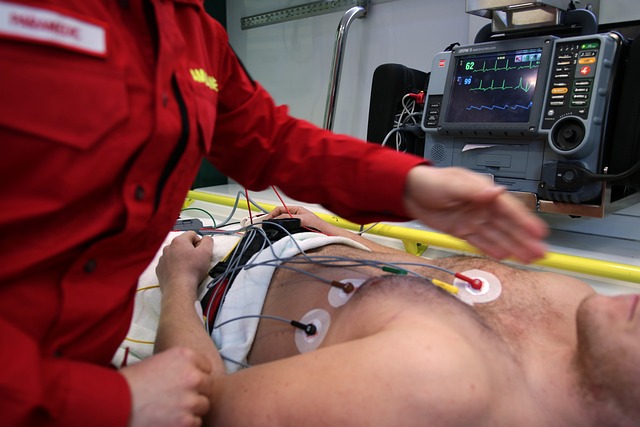EMS jobs require hard work, commitment, and sacrifice. To save lives, EMTs and paramedics must work together smoothly. If you want to have a job in EMS, you must understand the difference between the roles and responsibilities. Plus, knowing the career path and salary expectations in EMS can also help you plan your future.
This guide will help you understand everything about EMS jobs. Learn about duties, salaries, and tips on getting a job in EMS.
Different EMS Job Roles, Duties, and Salaries
Typically, there are four different jobs in EMS:
- Emergency Medical Responders (EMR)
- Basic Emergency Medical Technicians (EMT-B)
- Advanced Emergency Medical Technicians (EMT-A)
- Paramedics
The people performing the roles above have different academic qualifications, salaries, and job descriptions. Below, we’ll give an overview of each EMS role, job descriptions, responsibilities, and wages.
Emergency Medical Responder (EMR)
An EMR is a person with basic medical training who offers patients immediate medical attention in an emergency. They’re in charge of giving patients immediate life-saving interventions, including CPR. EMRs can also assist higher-level emergency professionals.
An EMR may also be involved in law enforcement, fire rescue, or industrial response.
EMR Duties
The duties of an EMR include the following:
- Administer Cardiopulmonary Resuscitation (CPR)
- Take and keep records of patients’ vital signs
- Ventilate patients with difficulty in breathing
- Treat musculoskeletal injuries
- Stop bleeding, disinfect, and bandage cuts and wounds
- Checking on the patient while awaiting professional treatment
- Provide primary care to a woman in labor
- Assist other emergency service workers
- Replace used supplies
- Disinfect and sanitize used equipment and the emergency vehicle
To carry out these duties and responsibilities effectively, an EMR should have the following skills:
- Calmness and composure in the face of pressure
- A basic understanding of medical-legal principles
- Performs only the duties within his scope of qualification
- Enough patience to carry out medical procedures
- Willing and ready to offer assistance to paramedics, EMTs, and other medical personnel
How to Become an EMR
EMR courses usually span for 55-65 hours in total. To qualify for an EMR course, you’ll need basic first aid skills and CPR. Some schools also require a GED or high school diploma to study an EMR course.
How Much Does an EMR Earn?
The average salary for an EMR is between $24 to $37 per hour. At Elite Ambulance, the starting salary of an EMR is $42,000* annually.

Emergency Medical Technician (EMT)
EMTs, or emergency medical technicians, are trained medical personnel who provide first aid to ill or injured people. EMTs need to take a course with practical training to respond to medical emergencies and provide patients with care. They also receive training to provide assistance and evaluation in pre-hospital settings.
There’s only so much an EMT can do on the field since they lack complete medical equipment for critical or severe injuries. Despite this, EMTs make every effort to ensure that patients in high-risk circumstances make it to the hospital. EMTs must maintain composure under pressure and possess in-depth knowledge of first aid and basic medical procedures.
EMT Duties
Here are some duties of an EMT on the job:
- Examine patients to determine appropriate care
- Provide emergency care using the proper techniques and equipment
- Document patient information, condition, and treatment
- Maintain patient confidentiality and care for them with respect for their rights
- Transport patients following outlined policies and procedures
- Operate and drive an ambulance with applicable safety policies and laws
- Offer first-aid treatment, such as bandaging wounds
- Provide life support care, such as cardiopulmonary resuscitation (CPR), when needed
- Assess a patient’s conditions and provide initial treatment
- Communicate with other emergency services, such as firefighters and police officers
How to Become an EMT
To qualify for EMT training, you’ll need to be 18 years or older and have a GED or high school diploma. A typical EMT-B course takes about 120 hours to complete, which is usually a total of six months.
How Much Does an EMT Earn?
An EMT’s average yearly wage is about $40,000, or $20 per hour. At Elite Ambulance, the starting salary for an EMT job is $51,480*.
Advanced Emergency Medical Technician (AEMT)
The primary responsibility of an advanced emergency medical technician is to offer critical and urgent care to patients who need emergency medical attention. They do this with basic and limited advanced emergency medical care. They also transport patients to hospitals.
Under the direction of a doctor, AEMTs work as a component of an extensive EMS response. AEMTs are qualified to use advanced equipment generally found in an ambulance. So, an AEMT is an intermediary between the accident scene and the emergency medical system.
AEMTs provide the same services as EMTs but have more qualifications. They are licensed to carry out advanced medical procedures and prescribe certain medications.
AEMT Duties
In addition to performing the duties of an emergency medical technician, AEMTs can do the following:
- Evaluate patients in trauma
- Assess patients and provide ventilation services
- Manage cardiac arrest
- Administer IVs
- Prescribe certain medication
- Intraosseous infusion for children
How to Become an AEMT
To be certified as an AEMT, you’ll need to have an EMT level qualification or higher. However, completing an AEMT course requires an extra 350 hours of training.
How Much Does an AEMT Earn?
In the US, an advanced emergency medical technician makes an average of $40,000 annually. But depending on the experience, company, and bonuses, an AEMT can earn from $21,000 to $69,500.
Paramedic
Paramedics provide advanced medical care to patients in critical conditions. They are the highest qualified EMS personnel. So, they can perform all duties across the different EMS jobs, such as interpreting labs, EKGs, X-rays, and manual defibrillation. The range of a paramedic’s work can involve both invasive and drug interventions.
A paramedic possesses all the knowledge, abilities, and responsibilities of an EMR, an EMT, and an AEMT. They differ from AEMTs because they can carry out a more comprehensive range of advanced tasks. These procedures are more complicated and involve a higher risk to the patient if done incorrectly. Also, the procedures a paramedic handles require significant knowledge of basic and applied sciences.
Paramedic Duties
The nature and severity of a patient’s situation determine the tasks and duties of a paramedic. Paramedics can do the following, among others:
- Monitor and administer medication, pain relief, and intravenous infusions
- Dress of wounds and injuries
- Use special medical equipment, including ventilators and defibrillators
- Transport patients to the hospital and providing treatment in transit
- Give detailed information on a patient’s condition and treatment to the hospital staff
- Assist hospital staff with patient care in hospitals and other medical facilities
- Communicate effectively with patients and their relatives or friends
- Teach and enlighten the public on using first aid techniques and equipment
How to Become a Paramedic
If you’re already an EMT, a paramedic course can help you get to the top of your EMS career. You’ll typically need an EMT level certification, a healthcare provider level certification, and letters of recommendation as proof of your prior work experience.
A paramedic course takes 1200-1800 hours and spans about 1-2 years to complete.
How Much Does a Paramedic Earn?
Of all EMS jobs, paramedics earn the most. However, their salaries can vary significantly depending on experience, certifications, and the company. On average, a paramedic in the United States earns about $49,368. However, at Elite Ambulance, the paramedic starting salary is $68,640*.
EMS Job Requirements
EMS jobs come with different requirements. However, some cut across all EMS jobs. Here’s a list of qualifications you’ll need to work in EMS.
- High school diploma, GED, or a suitable equivalent
- CPR Certification
- Complete any EMS courses required by your state
- A valid state driver’s license and satisfactory driving record
- Certification from the National Registry of Emergency Medical Technicians

6 Necessary Skills for Working in EMS
Being book-smart can only get you so far. Working as an EMS provider requires a lot of courage and skill to care for people in life-threatening situations. Strong emotional support is one of these skills. In addition, you must develop the ability to listen intently to people and understand their needs.
EMS jobs also require you to be meticulous while performing equipment maintenance and knowing what each tool does and how to use it correctly.
To succeed in an EMS job, you must also use the following skills every day.
1. Teamwork
Every EMS call requires team effort. Different personnel is usually present on the field, including the police, the fire department, or another EMS organization.
So, as an emergency service provider, you must constantly coordinate your efforts and strive for the best outcome for the patient. You can only achieve this by working together with others.
2. Mental Resilience
As a frontline healthcare professional, you’ll meet people on the worst days of their lives. And you can only stay level-headed in and after extreme situations like these if you look after your own mental health as well.
Plus, just like with every job with long shifts, working in EMS can get tiring. Strong mental resilience is a skill you build over time, but it’s something to practice every day as an EMT or paramedic.
3. Communication Skills
During your shifts as an EMS, you’ll communicate with people to get the job done. For instance, you’ll listen to the patient to find out what happened during the incident and what symptoms the patient has. By questioning witnesses and police, you may get more details about the incident.
You may have to give a team member a task or inform hospital staff about a patient’s condition. So, to get things done as quickly as possible, you’ll have to communicate effectively.

4. Compassion
Being a successful EMS provider requires you to be compassionate. Aside from giving physical care, you’ll also have to offer emotional support to patients. And patients aren’t the only ones who need compassion. Offering support to their loved ones can make a huge difference.
5. Quick Situational Awareness
As an EMT or paramedic, you’ll often only have seconds to determine a patient’s condition and the care you need to give. Observing the situation quickly and making a fast but accurate decision can save lives.
Also, situational awareness can go a long way in keeping you and your patient safe. You’ll be able to identify any risks to yourself or others. All you have to do is to be observant and vigilant. For instance, you could tell your team to leave the current site if you decide that treating the patient at a different location would be safer.
6. Physical Stamina
From being on your feet all day to the strength needed to lift other people, you can’t forget the physical side of being an EMT. You might have to take a fitness test to qualify as an EMS provider.
Benefits of Working in EMS
Working in EMS comes with several benefits. You get to gain experience and develop skills that can help you advance your career. Other advantages of working in EMS compared to other fields include the following.
Work Stability
Job growth for paramedics and EMTs is predicted to grow by 7 percent within the next six years. This means you’ll have a reliable job and the chance to find another one down the road. It’s also easy to advance your EMS career. After receiving your EMT certification, you can progress to a more advanced level of EMT or another form of health care professional.
Personal Fulfillment
Being on an emergency response team is the perfect method to fulfill your dedication to making a difference in your community. You’ll have the chance to use your knowledge and skills to save lives. When you respond to various medical emergencies as an EMR, EMT, AEMT, or paramedic, you’ll feel fulfilled by the hope you give to people through life-threatening medical emergencies.
Career Advancement Opportunities
Working as an emergency medical care provider can help you advance your medical profession. For example, if you work as a part-time EMS, you’ll gain field experience that will be useful on your journey to becoming a medical professional.
Early Career Start
Getting into the EMS field is easier than most professions. You only need a high school diploma or a GED to start your journey. So, you can begin a lifelong career as early as 18 years old. Also, you can choose to work part-time, earn money and advance your training. These courses take one to two years which is not as long as it takes to get a degree.
Variety of Experiences
The experience you’ll get as an EMS is almost unmatched. So, if you enjoy taking on various challenging tasks, you’re an ideal candidate for a paramedic. You’ll see different cases and patients as an EMS worker, and no two work shifts are the same. So, it never gets boring.

Flexible Work Hours
EMS providers work in shifts, which is another excellent benefit of an EMS job. You’ll only have to work for a couple of hours, after which you can spend the rest of the day doing other activities. So, if time is a factor for you, an EMS job just might be what you need.
How to Apply for an EMS Job
The market for EMS jobs is quite competitive. Many aspiring EMTs are attempting to enter the field right out of college, while others are looking to change careers from related or unrelated fields. Usually, candidates with more work experience stand a higher chance of getting EMS jobs.
Regardless of your existing work experience, there are several things you can do to make your application for an EMS job stand out. Some of these include:
- Improve your communication skills
- Learn all protocols and regulations
- Obtain the necessary certification and skills
- Get impressive scores on your tests and examinations
- Be in great shape physically and mentally
- Be a volunteer EMT
Quick Links for Aspiring EMS Professionals
Looking to start an EMS course?
Take an EMR Course
Become an EMT – and Get a Job Immediately
Further Education to Become a Paramedic
Already qualified?
Apply to Work as an EMR, EMT or Paramedic in Chicago
With a starting salary of
- EMR: $42,000*
- EMT: $51,480*
- Paramedic: $68,640*
*Annual salary, before taxes, based on industry-average 50-hour workweeks.
Comments are closed.



Recent Comments